Language Curriculums for Speech Therapy
Comprehensive Plans for Boosting Language Skills
Stop spending hours hunting for language activities that only partly fit your students’ needs.
Our comprehensive language curriculums give you ready-made therapy plans to help children understand others, express themselves clearly, and thrive in every setting—in therapy, at home, or in the classroom.
You’ll know exactly what to teach next, without second-guessing your plan.
✅ Evidence-based. Organized. Ready to use.

Instant access. No risk. Cancel anytime.
Who’s it For?
Children and teens who have trouble following directions
Those who struggle to ask and answer questions
Those who have trouble retelling past events in a way that makes sense
Those with grammar/syntax errors
Those who struggle with figurative language
Those who struggle with reading and writing
Those who use vague or imprecise language/words or don’t know what things are called
Who Can Use It?
Speech-Language Pathologists and Professionals
Speech Language Therapy Assistants and SLPAs
Parents and Caregivers
Teachers and Educators
Choose your Curriculum:
Following Directions Curriculum:
What is it? A comprehensive, step-by-step program that helps children strengthen their ability to follow directions — from simple one-step tasks to complex, multi-step instructions — building the attention, comprehension, and confidence they need to succeed in everyday tasks.
Who is it for?
Children and teens who…
- Struggle to follow one-step directions
- Struggle to follow multi-step directions
- Are easily distracted when following directions
How does it work?
This Curriculum is broken down into three levels:
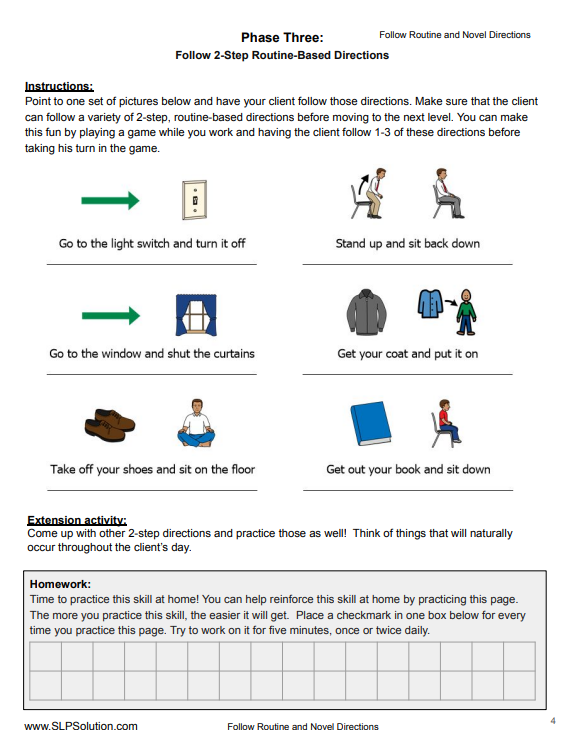
Beginner Level:
Basic Directions
(Ages 1-4 yrs and beyond)
- Following One-Step Routine Directions
- Following One-Step Novel Directions
- Following Two-Step Directions (Routine and Novel)
- Following Directions with Spatial Concepts
Intermediate Level:
Expanded Directions
(Ages 4-7 yrs and beyond)
- Following 3-Step Directions (Routine and Novel)
- Following Directions with Temporal Words: Before and After
Advanced Level:
Functional Directions
(Ages 5-8 yrs and beyond)
- Following Classroom and Academic Instructions
- Managing Larger, Functional Directions
* Age ranges represent when children typically master these skills. However, this program can help older children/teens with these skills as well.
Instant access. No risk. Cancel anytime.
Asking and Answering Questions Curriculum:
What is it? A ready-to-use, systematic program that saves you hours of prep time with pre-made lessons for every question type — teaching children to ask and answer questions in a clear, structured way that leads to faster success.
Who is it for?
Children and teens who…
- Have trouble answering basic wh- questions like “who, what, where,” etc.
- Have trouble asking questions in a way that makes sense
- Struggle to answer questions about something they just heard, such as a story being told or information provided
How does it work?
This Curriculum is broken down into three levels:
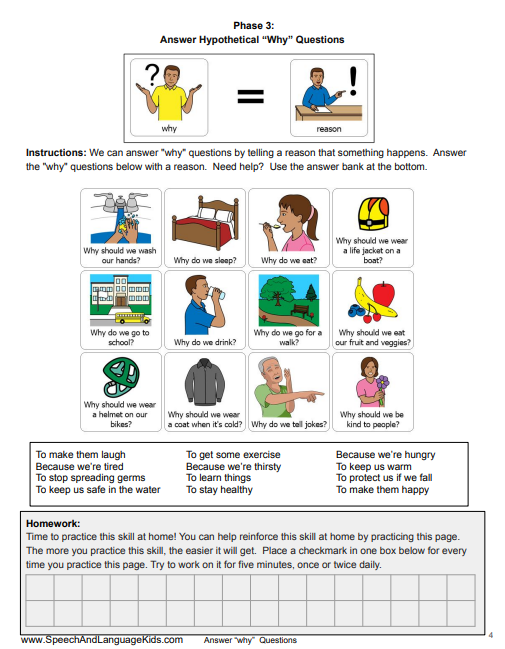
Beginner Level:
Answering Yes/No and Individual “Wh-” Questions
(Ages 2-6 yrs and beyond)
- Yes/No Questions
- What Questions
- Who Questions
- Where Questions
- When Questions
- Why Questions
- How Questions
- Which Questions
Intermediate Level:
Asking and Answering Mixed Questions in Conversation
(Ages 4-7 yrs and beyond)
- Asking Questions with Correct Syntax
- Answering Mixed Questions
- Answering Questions about Past Events
Advanced Level:
Using Questions in Classwork and Daily Activities
(Ages 5-10 yrs and beyond)
- Asking and Answering Questions in Academic Work:
- Asking and Answering Questions for Self-Advocacy
- Asking and Answering Questions in Conversations with Others
* Age ranges represent when children typically master these skills. However, this program can help older children/teens with these skills as well.
Instant access. No risk. Cancel anytime.
Sequencing/Retelling Curriculum:
What is it? A scaffolded, ready-to-use program that makes it easy to teach children how to sequence and retell past events — and even stories — clearly and coherently, helping them build stronger narratives and faster communication progress.
Who is it for?
Children and teens who…
- Struggle to retell a past event or story
- Struggle to retell events in a logical sequence or order
- Start in the middle when retelling paste events or stories, or don’t provide enough background information
How does it work?
This Curriculum is broken down into three levels:
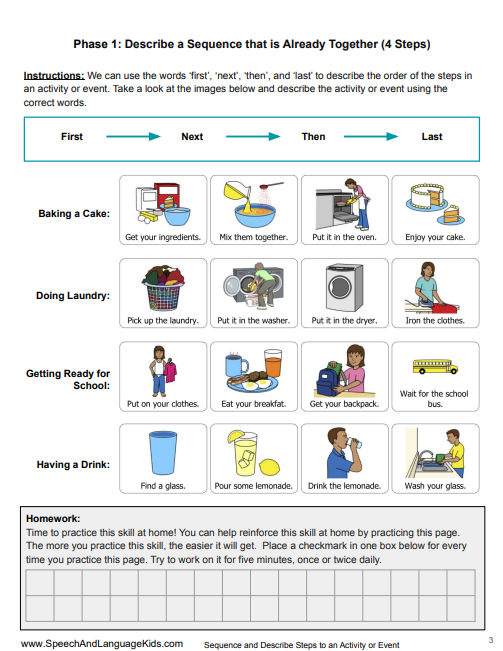
Beginner Level:
Sequencing and Retelling Common Tasks
(Ages 4-6 yrs and beyond)
- Sequencing and Describing Steps to Common Activities
Intermediate Level:
Retelling Past Events
(Ages 4-7 yrs and beyond)
- Answering Questions about Past Events
- Sequencing and Retelling Past Events
Advanced Level:
Using Sequencing and Retelling in Classwork
(Ages 5-8 yrs and beyond)
- Understanding, Retelling, and Producing Narratives
- Using Temporal Concepts: Before, During, After
* Age ranges represent when children typically master these skills. However, this program can help older children/teens with these skills as well.
Instant access. No risk. Cancel anytime.
Grammar and Syntax Curriculum:
What is it? A systematic, results-driven program for teaching grammar and syntax — replacing scattered, one-off lessons with a clear, structured progression that helps children and teens build lasting language skills.
Who is it for?
Children and teens who…
- Have syntax grammar errors in their conversational speech
- Have speech that sounds telegraphic (missing words or grammar so they sound choppy)
- Use sentences/utterances that are shorter or less complex than others their age
How does it work?
This Curriculum is broken down into three levels:
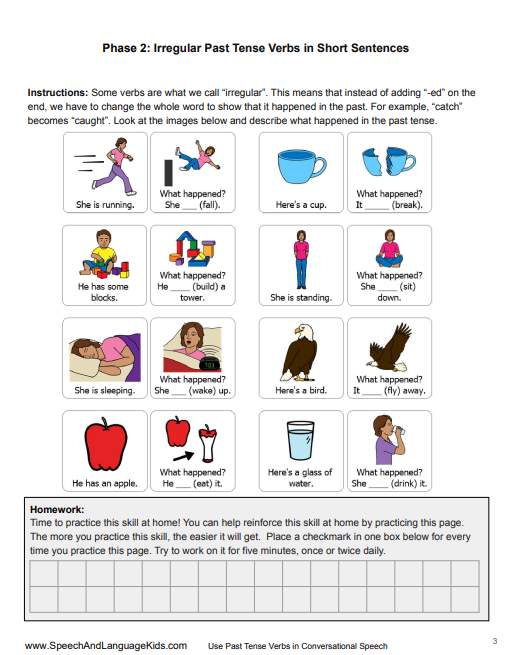
Beginner Level:
Foundational Grammar Skills
(Ages 2-5 yrs and beyond)
- Articles (a, an, the)
- Present progressive (-ing verbs)
- Pronouns (he, she, they, it, we, etc.)
- Plurals (regular and irregular)
- Past tense (-ed endings, irregular verbs)
- Auxiliary verbs (is, am, are, was, were, has, have)
- Possessive forms (‘s)
- Simple conjunctions (and, but, because)
- Basic Sentence Structure: Subject + Verb + Object
Intermediate Level:
Expanding Sentence Complexity
(Ages 4-8 yrs and beyond)
- Compound sentences (and, but, or, so, yet)
- Complex sentences (because, although, unless, while, after)
- Matching verb tense to subject (e.g., He runs vs. They run)
- Comparatives and superlatives (bigger, biggest)
- Prepositional phrases (“The cat sat under the table.”)
- Modal verbs for polite requests or hypotheticals (can, could, should, would, might)
Advanced Level:
Mastering Grammar for Effective Communication
(Ages 6-13 yrs and beyond)
- Correcting sentence fragments and run-ons
- Expanding, combining, or reducing sentences
- Active vs. passive voice
- Relative clauses (“The boy who won the race is my friend.”)
- Conditional sentences (“If I had studied, I would have passed.”)
- Parallel sentence structure (“She likes to swim, to bike, and to run.”)
- Transition words (therefore, however, consequently, in contrast)
* Age ranges represent when children typically master these skills. However, this program can help older children/teens with these skills as well.
Instant access. No risk. Cancel anytime.
Abstract Language Curriculum:
What is it? A structured, low-prep program that makes it easy to teach abstract language skills systematically — helping children and teens understand and use figurative and nuanced language with clarity and confidence.
Who is it for?
Children and teens who…
- Struggle with figurative language (idioms, sarcasm, similes, metaphors, etc.)
- Struggle with making inferences
How does it work?
This Curriculum is broken down into three levels:
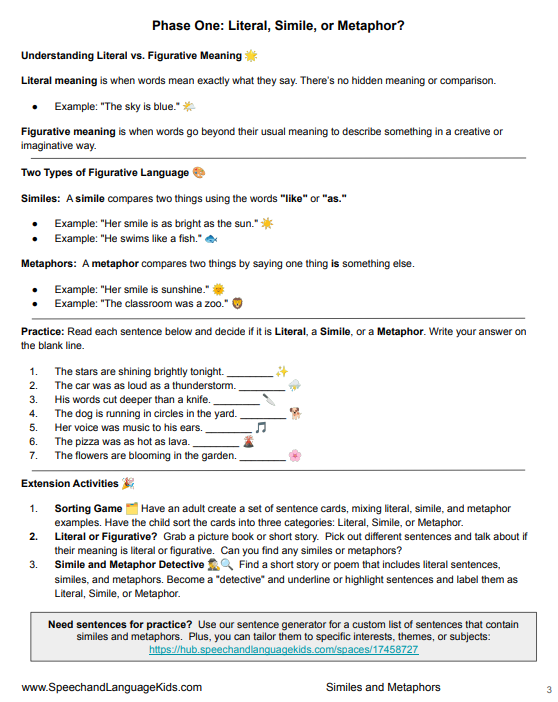
Beginner Level:
Literal vs. Nonliteral Language
(Ages 5-7 yrs and beyond)
- Identify literal vs. nonliteral language
Intermediate Level:
Figurative Language
(Ages 6-10 yrs and beyond)
- Idioms and Figures of Speech
- Similes and Metaphors
Advanced Level:
Inferencing and Social Nuance
(Ages 7-12 yrs and beyond)
- Inferencing in Text and Social Inferencing
- Understanding Sarcasm and Irony
* Age ranges represent when children typically master these skills. However, this program can help older children/teens with these skills as well.
Instant access. No risk. Cancel anytime.
Vocabulary Curriculum:
What is it? A comprehensive, developmentally layered program that teaches vocabulary the smart way — starting with key words for younger children and progressing to powerful word-learning and word-attack strategies for older students, so they can confidently grow their vocabulary long after therapy ends.
Who is it for?
Children and teens who…
- Use vague or imprecise language/words
- Have trouble following directions that contain unfamiliar words/concepts
- Don’t know what things are called or struggle to understand words that they read/hear
How does it work?
This Curriculum is broken down into three levels:
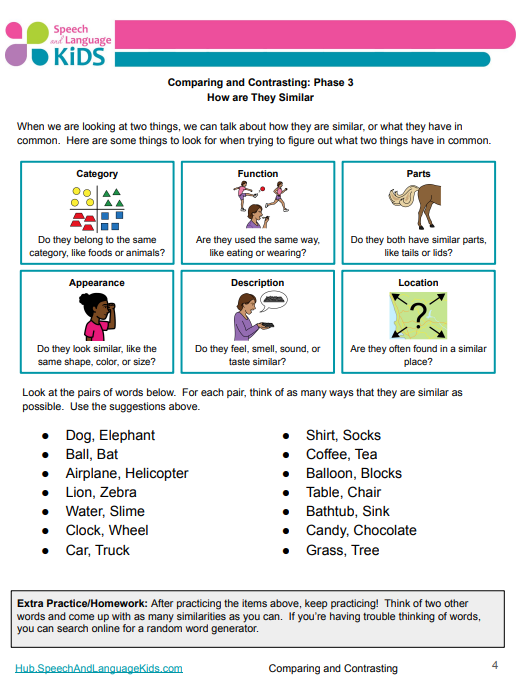
Beginner Level:
Building a Core Vocabulary
(Ages 1-2.5 yrs and beyond)
- Building a Vocabulary of the First 50 Words
- Producing 2-Word Combinations
- Expanding Vocabulary of Nouns
Intermediate Level:
Increasing Word Knowledge and Usage
(Ages 2-6 yrs and beyond)
- Spatial Concepts
- Adjectives
- Comparing and Contrasting
- Temporal Concepts
- Quantitative Concepts
Advanced Level:
Academic Vocabulary and Independent Word Learning
(Ages 5-12 yrs and beyond)
- Understand and Use Multiple Meaning Words
- Understand and Use Antonyms and Synonyms
- Using Affixes (Prefixes and Suffixes) and Roots to Decode Unknown Words
- Other Word Attack and Word Learning Strategies as Appropriate
* Age ranges represent when children typically master these skills. However, this program can help older children/teens with these skills as well.
Instant access. No risk. Cancel anytime.
Language Foundations for Literacy Curriculum:
What is it? A structured, step-by-step program for building the language foundations that support reading and writing success — giving children the skills they need to understand text, express ideas, and thrive in literacy.
Who is it for?
Children and teens who…
- Struggle with phonological awareness skills (like rhyming, alliteration, etc.)
- Struggle with understanding texts (such as identifying story elements or main idea/details)
- Struggle to produce their own writings
- Are not meeting literacy expectations in academic work/school
How does it work?
This Curriculum is broken down into three levels:
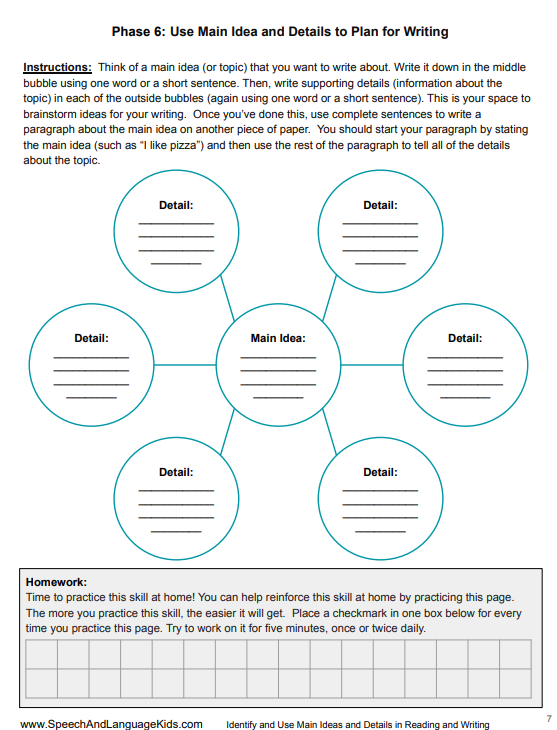
Beginner Level:
Pre-Literacy Foundations
(Ages 2-6 yrs and beyond)
- Phonological Awareness
- Print Awareness
- Basic Story Structure
Intermediate Level:
Understanding and Using Discourse Structures
(Ages 4-9 yrs and beyond)
- Understanding, Retelling, and Producing Narratives
- Identifying Main Idea and Detail
- Understanding, Retelling, and Providing Information
- Understanding, Retelling, and Stating Opinions
Advanced Level:
Critical Thinking for Reading and Writing
(Ages 5-14 yrs and beyond)
- Inferencing
- Making Predictions
- Understanding abstract language
- Identifying author’s purpose and perspective
- Synthesizing information from multiple sources
- Organizing and Expressing Ideas in Writing
* Age ranges represent when children typically master these skills. However, this program can help older children/teens with these skills as well.
Instant access. No risk. Cancel anytime.
You Don’t Have to Do This Alone.
Every child’s communication journey is unique — but you don’t have to reinvent the wheel for each one.
Our Speech Sound Curriculums are just the beginning. Inside the SLK Curriculum, you’ll find comprehensive therapy plans for every major area of communication:
- Language (vocabulary, grammar, comprehension, etc.)
- Speech sound pronunciation
- Social communication and pragmatic skills
- Fluency and stuttering
- Voice and resonance
- Functional Communication
Each curriculum walks you through the therapy process step-by-step — from first session to mastery — so you can spend less time planning and more time helping children and teens succeed.

Because when you have a clear plan, children make faster progress.
And when children start communicating clearly and confidently… everything changes.
Podcast: Play in new window | Download | Embed
Subscribe: Apple Podcasts | RSS



Leave A Comment